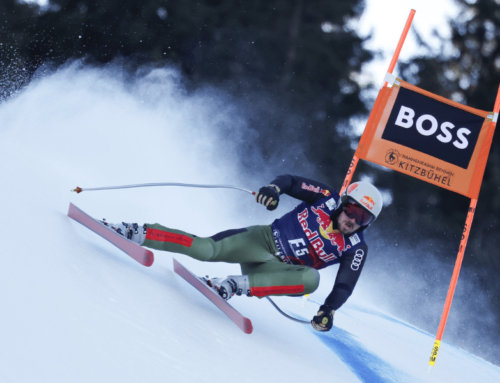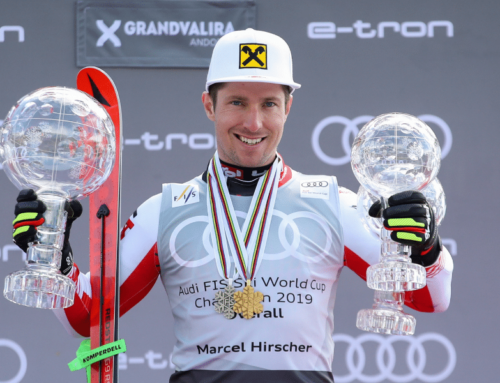Utah Jazz: University of Utah wins NCAA Championship title
Utah Jazz: University of Utah wins NCAA Championship title{mosimage}HANOVER, N.H.–Ask college coaches why their teams did well at the NCAA championships, and the word ‘chemistry’ is almost always part of the answer. A team with momentum, with camaraderie and with skiers who like to see each other win as much as themselves. At the 2003 NCAA Skiing Championships, hosted by Dartmouth College from March 5 to 8, the University of Utah had as much chemistry as a team could cook up.
‘It’s not about better skiers or better people’ explained Ute head coach Kevin Sweeney. ‘It’s just that they all really got this synergy going. It’s really something hard to explain, but I think everyone, especially experienced coaches, know. Our momentum was very special, which puts this result as the highlight of my coaching career. I think we’ve had a little bad luck in the past, but it takes time to develop a winning program, especially when surrounded by such powerhouses as the Colorado schools and UVM. You can’t just waltz in there and win. You need the chemistry.’
Utah used this chemistry to overcome a first-day 24-point deficit behind the University of New Mexico, and then launch themselves into a huge lead on day two. By the end of the championship, the Utes had their 10th team trophy, marking the most championships any team has won in the last 25 years and their first since 1997. Undaunted by a full buffet of New England weather, the Utes gathered 682 points, 131 more than surprise runner-up Vermont (551 points). The margin is a NCAA record. A frustrated University of Colorado team, in close rivalry with Utah all season, was never able to rise above third, finishing with 546.5 points.
As for the defending champions, the University of Denver dug itself into a pit in the nordic races — both literally and figuratively, as its waxing tent sat in a snow bank far from the action. And it was a pit the skiers just couldn’t get out of. Without the dominating men’s nordic team that has led the Pioneers in the last three years, they languished in ninth after the freestyle races on March 5. When asked about the Pioneers’ chances in the rest of the meet, nordic coach Knut Nystad said, ‘It would be hard to do worse.’ But it was also hard to do much better. They finished fifth.
Coming off a strong performance at regionals, the Utes had a jittery start at nationals. New Mexico’s Jimmy Vika won the men’s 10km freestyle race ahead of Vermont’s Lowell Bailey and helped the Lobos take the lead on day one. A freshman, Vika has won every collegiate freestyle race he’s entered this season. A former Norwegian ski team member, he says collegiate skiing ‘isn’t easy, not at all’ but that he’s used to skiing against people like Thomas Alsgaard, four-time Olympic gold medalist. The best the Utes could do behind Vika, though, was Ryan Quinn in tenth.
Even Katrin Smigun had a slow start in the women’s 5km freestyle, also on March 5, at one point getting splits indicating she was down on Northern Michigan’s Hilary Patzer. But as rain began to fall, the Estonian phenom rallied and took home the first of four individual NCAA titles for Utah.
‘The cross-country men opened up a bit off, but I attribute that to nerves’ said Sweeney. ‘Still, we had solid points. I actually liked sitting in second after day one. It allowed for good assessment of the competition, and it absolutely fired us up.’
Polar air moved in that night and turned the rain-soaked GS hill to ice — ‘World Cup firm’ as one spectator noted. It was business as usual for the Eastern teams, but many of the Western skiers looked tentative. While the top racers tucked most of the flat course, others looked as if they weren’t quite ready to commit to any more speed.
‘We don’t ski on ice like this in the West’ explained head Buffalo coach Richard Rokos who, in so many words, proclaimed the day a disaster. ‘But it shouldn’t have caused them problems. It’s perfect for racing, couldn’t be better.’
Most of his skiers thought differently. ‘I’m not from the East, I don’t like the ice, I like powder’ said CU skier Mia Cullman, trying to explain her uncharacteristically low 24th place.
After training on an actual World Cup hill in Park City, the Utes skied as if they were driving on dry pavement and vaulted to a 67-point lead over the Lobos. Freshman Ben Thornhill surprised everyone — though mostly himself — by winning the men’s GS. Thornhill had all but given up ski racing after two years on Canada’s development team. At Utah, he was just filling a spot on the team but soon rediscovered his love for the sport and started believing in himself again. ‘His win is a huge surprise’ said Utah’s alpine coach, Aaron Atkins. ‘We knew he was talented, but he hadn’t been on skis in a year. He continues to baffle me!’
The women’s GS was also ruled by a freshman. Vermont’s Jamie Kingsbury, winner of every collegiate GS but one this season, used her uncanny knack for finding the fastest line to beat first-run leader Lina Johansson. ‘I was nervous the first run’ said Kingsbury. ‘I wasn’t sure how I’d size up against the Western skiers. But second run, I relaxed and had some fun.’
A former member of the Swedish Junior National Team, Johansson raced on the Europa Cup for three years. With teammate Rowena Bright in third, the Utes were inflicting heavy damage on rival teams.
The next day, March 7, Utah solidified its lead in the classical races. Adding the icing to her undefeated season, Smigun took off early in the women’s 15km race and never looked back, beating Alaska-Fairbanks’ Sigrid Aas by more than a minute. ‘I knew Sigrid was tough’ said the Estonian, who has an eye on the 2006 Olympics. ‘I saw her skis were really fast. I started to go after the second k, and she couldn’t keep up. It was tough though, really icy. I lost my (kick) wax on the second lap, so it was harder. It’s hard to push by yourself too. So later, I didn’t push so hard. I thought, ‘I’m going to win.”
In the exciting men’s 20km race, Chris Cook of Northern Michigan University nipped UVM’s Ethan Foster at the line. The two broke away from Tobias Schwoerer, Alaska-Anchorage’s top skier, on the last uphill and played cat-and-mouse for the last 3 kilometers.
‘The three of us were tip-to-tail’ said a triumphant Cook. ‘I took off and Ethan saw my move and went right with me.’
They came into the stadium with Foster drafting off Cook. But the Vermonter couldn’t get by, and Cook took him by a boot length. Coach Sten Fjeldheim knew Cook, a Wisconsin native, was in really good shape and could win the classical title. ‘We figured Ethan would be the toughest challenge’ said Fjeldheim. ‘But Chris is the better sprinter.’
Cook’s victory marks the first time since 1993 that an American has won a NCAA nordic title. In 1993, Peter Vordenberg, also of Northern Michigan, won the men’s 20km freestyle.
‘Cook is a senior, so I wanted to let him win’ joked Foster, who was irked that Ski Racing had left him off the NCAA podium predictions. ‘I’ve got two more years!’
Now 99.5 points in the lead, Utah just had to stand up in slalom, the event that Coach Atkins described as its nemesis. But instead of taking it easy on March 8, the team chose to attack, knowing that conservative skiing would lead to mistakes — a lesson learned from earlier in the season.
Johansson led the charge, dominating both runs of the women’s slalom. Behind her were Colby College’s Jenny and Abbi Lathrop, sitting at 2-3 before the afternoon run. But Abbi faltered and fell to fifth while Jenny held onto second. Skiing in weather more to her liking, CU’s Cullman finished third.
The men’s slalom served up some suspense for the 2,000 spectators who showed up for the final day of competition. Vermont’s Jimmy Cochran and Dartmouth’s Brad Wall tied on the first run. If Cochran won, the slalom title won by Roger Brown in 2002 would stay in the family; if Wall won, it would stay with Dartmouth. Somewhere along the second course, the Big Green skier gained 0.02, and the crowd went
wild.
‘I couldn’t think of a better way to end my college career’ said Wall, who hasn’t raced since returning from World Championships. ‘I skied the best over two runs of slalom that I have all year. It was great doing it at the Skiway too. A lot of friends came out to support the team, and people from the community came out to volunteer, and it was great to get a win for them.’
Meanwhile, Cochran was racing on a hill that he hates. No, make that detests. At first glance, the trail looks simple but has many subtle rhythm changes. ‘(This type of hill) always gives me trouble. For someone like Roger or Brad, who ski in such solid body positions, this is not a problem. For a skinny kid that sits too far back, not good.’
Cochran also said he has stagnated in the last month. ‘I try to gauge my skiing not only on where I am at any given point in an infinite progression, but the rate at which I’m progressing. If, at the end of the day, I’m a better skier than I was when I woke up, then I’m happy. I haven’t had that feeling much lately, perhaps because I’ve been too preoccupied with winning races instead of just skiing well.’
But Cochran still came away with a bronze in GS and silver in slalom — finishes that helped lead Vermont to a surprise second place team finish. The Cats came into the championships as, uh, underdogs, already down two nordic skiers who didn’t qualify. ‘Second is a miracle’ head coach Chip LaCasse told the Burlington Free Press. ‘I’m as proud of this team as I would be winning.
Added LaCasse, on the verge of retiring after 34 years with the Catamount skiers, ‘We drove down here with four zeros. You just can’t go in losing four scoring opportunities before the thing even starts. But we took it as a challenge, and to finish second in the country, that’s a huge, huge thing. It’s a credit to this team and to these kids.’
The Cats had seven top-three finishes — more than any other team — and the men’s nordic team won the freestyle event. ‘Only they believed they could ski with the western teams’ said LaCasse of his ‘homegrown’ all American nordic skiers.
It’s a belief that winners know well. ‘It’s not a false ‘we’re-the-best’ kind of thing’ said Sweeney of his team. ‘They know they’re good, so they just go out and have fun.’ It’s just all the more fun if you win.





















